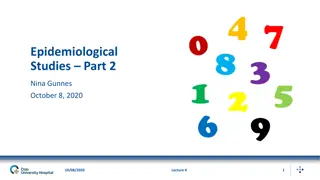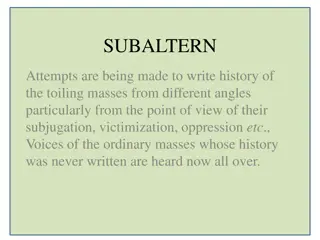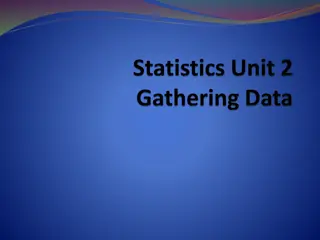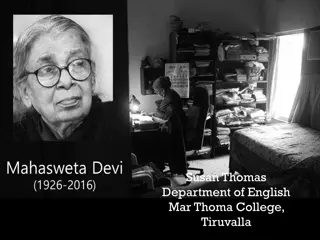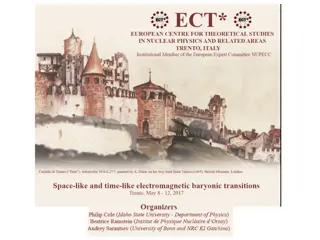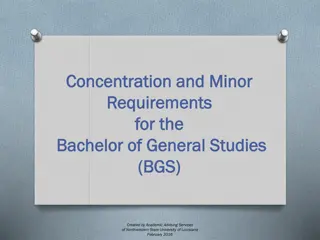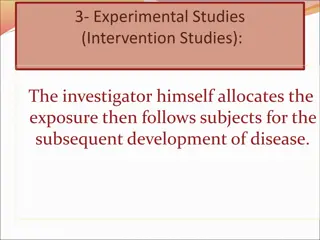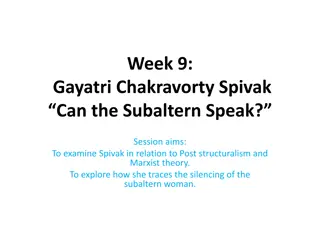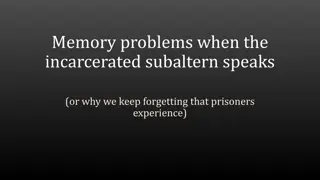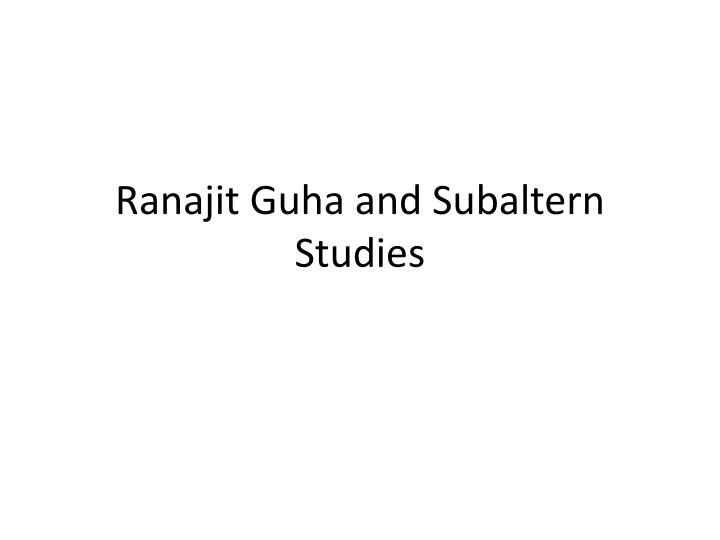
Shifts in Historical Studies: From Marxism to Subaltern Studies
Explore the intellectual currents and thematic shifts in historical studies post-World War 2, focusing on the emergence of Subaltern Studies and Ranajit Guha's contributions. Learn about the influence of Antonio Gramsci, the Naxalbari movement, and Guha's work on understanding peasant insurgency in colonial India.
Download Presentation

Please find below an Image/Link to download the presentation.
The content on the website is provided AS IS for your information and personal use only. It may not be sold, licensed, or shared on other websites without obtaining consent from the author. If you encounter any issues during the download, it is possible that the publisher has removed the file from their server.
You are allowed to download the files provided on this website for personal or commercial use, subject to the condition that they are used lawfully. All files are the property of their respective owners.
The content on the website is provided AS IS for your information and personal use only. It may not be sold, licensed, or shared on other websites without obtaining consent from the author.
E N D
Presentation Transcript
Ranajit Guha and Subaltern Studies
Broad movements/shifts in historical studies after WW2 Intellectual currents: from Marxism to structuralism, post-structuralism Thematic shifts: from social history and history from below to cultural history The politics of knowledge: from Eurocentrism to postcolonial perspectives and the critique of Eurocentrism SUBALTERN STUDIES: a major site where these shifts can be observed in a non-European historiographical context
Ranajit Guha and the emergence of the Subaltern Studies collective Ranajit Guha politicized by left-wing, Communist- dominated student milieu of Calcutta in the 1940s; involved heavily in Communist Party of India (CPI) in 1940s and 1950s 1959-80: based in England. University of Sussex in 1970s: Guha, along with a group of like-minded colleagues and students, sets up Subaltern Studies 12 volumes of essays published by Subaltern Studies collective between 1982 and 2005 Other major scholars associated with the project: David Hardiman, Shahid Amin, Gyanendra Pandey, David Arnold, Sumit Sarkar, Dipesh Chakrabarty, Partha Chatterjee.
Influences on Guha and Subaltern Studies Intellectual currents: a) History from below; b) Antonio Gramsci: concept of subaltern enrichment and revision of traditional Marxist concepts of class struggle Political processes: churning and shifts on the radical left. Growing importance of peasant movements, guerrilla uprisings. India and elsewhere: emergence of a distinctly Maoist current in revolutionary politics. Naxalbari movement: key influence on Ranajit Guha in the 1970s
Guha: Elementary Aspects of Peasant Insurgency in Colonial India (1983) Peasants, largely illiterate, leaving no direct traces about. How to read them back into history: Guha: reading against the grain understanding the official codes through which colonial government addressed peasant uprisings. Colonial archive: an archive of counter- insurgency . Forms of peasant dissent and protest, Guha argued, could also be understood in terms of certain codes they followed. Modes of rural insurgency anatomized and itemized.
Early Subaltern Studies: early-mid 1980s Basic contention of early Subaltern Studies: relationship between 2 domains of politics elite and subaltern . Peasant protest in India seen to be driven by more than purely economic motives (in contrast to orthodox-Marxist understandings). Idioms of protest (often religious) studied seriously. Problematizing dominant nationalist and Marxist accounts of anti-colonial nationalism. Outstanding examples: a) Shahid Amin Gandhi as Mahatma role of rumour in constructing Gandhi s appeal; b) David Hardiman tribal assertions against liquor dealers intertwined with popular religious beliefs
Late 1980s: the postcolonial shift in Subaltern Studies Warm endorsement by Edward Said helped establish Subaltern Studies as a globally influential perspective from the Third World . Gayatri Chakrabarty Spivak: Can the Subaltern Speak? Critiquing a) exaggeration of emancipatory potentials of peasant resistance; b) the politics of representation in Subaltern Studies on what grounds does the radical historian speak for the subaltern ?; c) lack of attention to gender. Late 1980s, 1990s: shift in Subaltern Studies from history from below to deconstructions of colonial discourse , critiques of universalizing claims of Eurocentric history. Eg. Dipesh Chakrabarty: Europe as the unavoidable subject- object of History: need to provincialize Europe.


